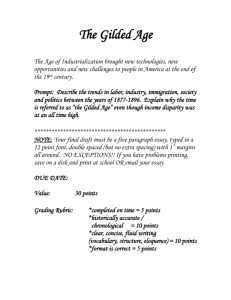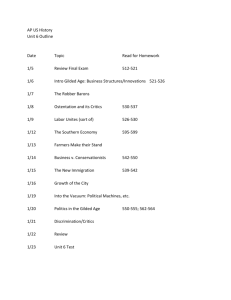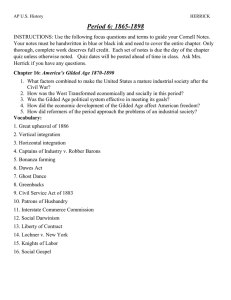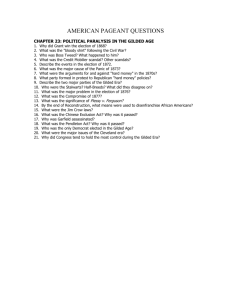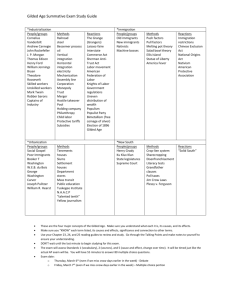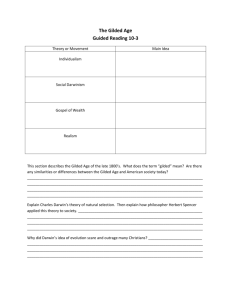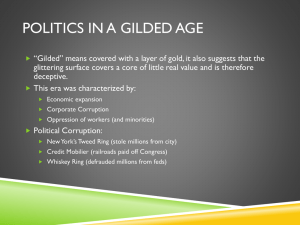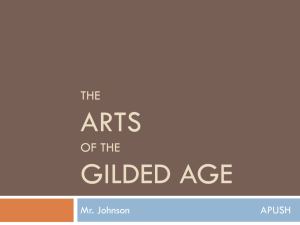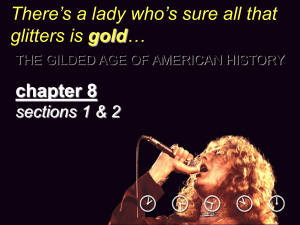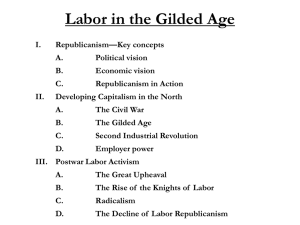CHAPTER 16 – America's Gilded Age (1870 – 1890) KEY TERMS
advertisement
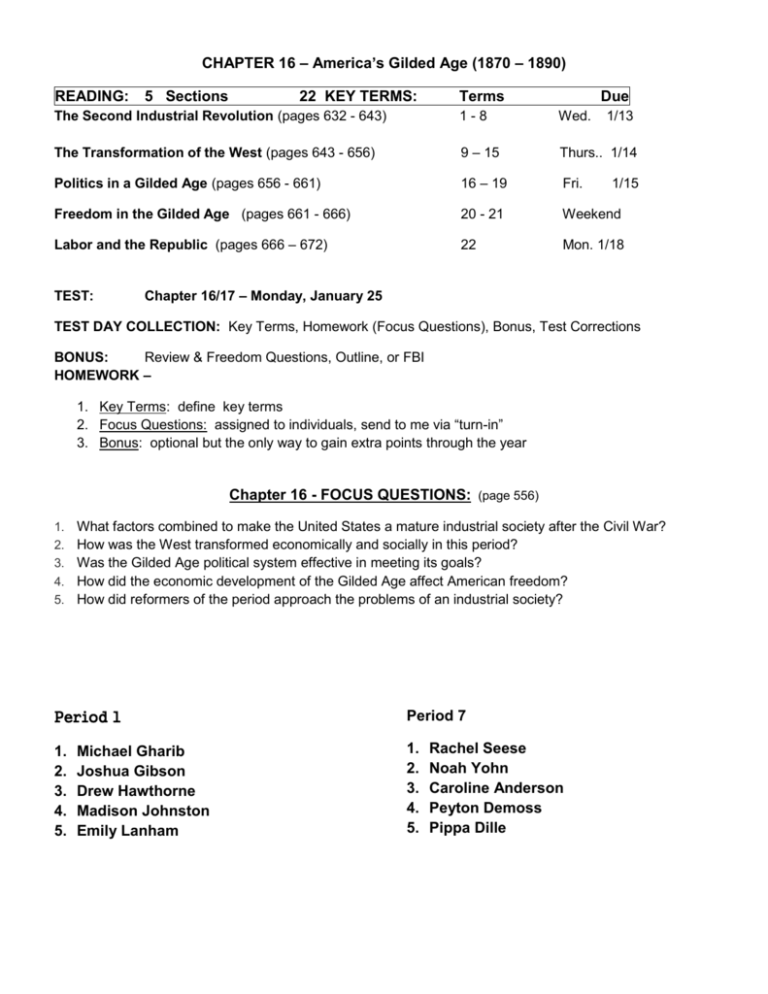
CHAPTER 16 – America’s Gilded Age (1870 – 1890) READING: 5 Sections 22 KEY TERMS: Terms Due The Second Industrial Revolution (pages 632 - 643) 1-8 Wed. The Transformation of the West (pages 643 - 656) 9 – 15 Thurs.. 1/14 Politics in a Gilded Age (pages 656 - 661) 16 – 19 Fri. Freedom in the Gilded Age (pages 661 - 666) 20 - 21 Weekend Labor and the Republic (pages 666 – 672) 22 Mon. 1/18 TEST: 1/13 1/15 Chapter 16/17 – Monday, January 25 TEST DAY COLLECTION: Key Terms, Homework (Focus Questions), Bonus, Test Corrections BONUS: Review & Freedom Questions, Outline, or FBI HOMEWORK – 1. Key Terms: define key terms 2. Focus Questions: assigned to individuals, send to me via “turn-in” 3. Bonus: optional but the only way to gain extra points through the year Chapter 16 - FOCUS QUESTIONS: (page 556) 1. 2. 3. 4. 5. What factors combined to make the United States a mature industrial society after the Civil War? How was the West transformed economically and socially in this period? Was the Gilded Age political system effective in meeting its goals? How did the economic development of the Gilded Age affect American freedom? How did reformers of the period approach the problems of an industrial society? Period 1 Period 7 1. 2. 3. 4. 5. 1. 2. 3. 4. 5. Michael Gharib Joshua Gibson Drew Hawthorne Madison Johnston Emily Lanham Rachel Seese Noah Yohn Caroline Anderson Peyton Demoss Pippa Dille CHAPTER 16 – America’s Gilded Age (1870 – 1890) KEY TERMS 1. Statue of Liberty: (632-633) 2. 2nd Industrial Revolution: (633 – 635) [causes for economic growth, what types of production expanded to create a more mature industrial society, Railroads impact, Time zones] 3. Technical Innovations: (636 – 637) 4. Business Competition – “pools”, “trusts”, mergers: (638) [merger examples] 5. Andrew Carnegie & John D Rockefeller – vertical integration, horizontal integration: (638 – 639) [Puck, pg. 641] 6. Workers plight: (641-642) [skilled / unskilled workers, wages, work conditions, women in the workplace] 7. Wealth versus Poverty during Industrialization: (642-643) [Waldorf-Astoria Hotel costume ball, How the Other Half Lives by Jacob Riis] 8. Turner Thesis: (643) [How did Frederick Jackson Turner describe the western frontier? Was the west previously uninhabited?] 9. Agriculture in the trans-Mississippi West: (645-646) [hardships in Middle Border, Great Plains, women, bonanza farms] 10. Cowboys & Cattle: (647-648) [other industries in the West] 11. Buffalo, Nez Perce Indians, Chief Joseph: (649, 652) 12. Battle of Little Bighorn: (652) 13. Assimilation of American Indians: (653-655) [1871 Treaty System ends, Carlisle Boarding School, Bureau of Indian Affairs, Dawes Act, Elk v Wilkins 1884] 14. Wounded Knee & Ghost Dance: (655) 15. Gilded Age: (656) [mark Twain, Charles Dudley Warner, meaning] 16. “Boss” William M Tweed: (657) [NYC politics of corruption] 17. Grant Administration corruption: (657-658) [Credit Mobilier, Whiskey Ring] 18. Elections of 1876 & 1888: (658) 19. Reform Legislation: (659-660) [Civil Service Act 1883, Interstate Commerce Commission ICC 1887, Sherman Anti-Trust Act 1890] 20. Social Darwinism: (662) [William Graham Sumner] 21. US v E.C. Knight Co.: (665) [Supreme Court case rules on power of business] 22. Strikes - Great Railway Strike of 1877, Knights of Labor, Haymarket Affair: (666 – 667, 670-671)
